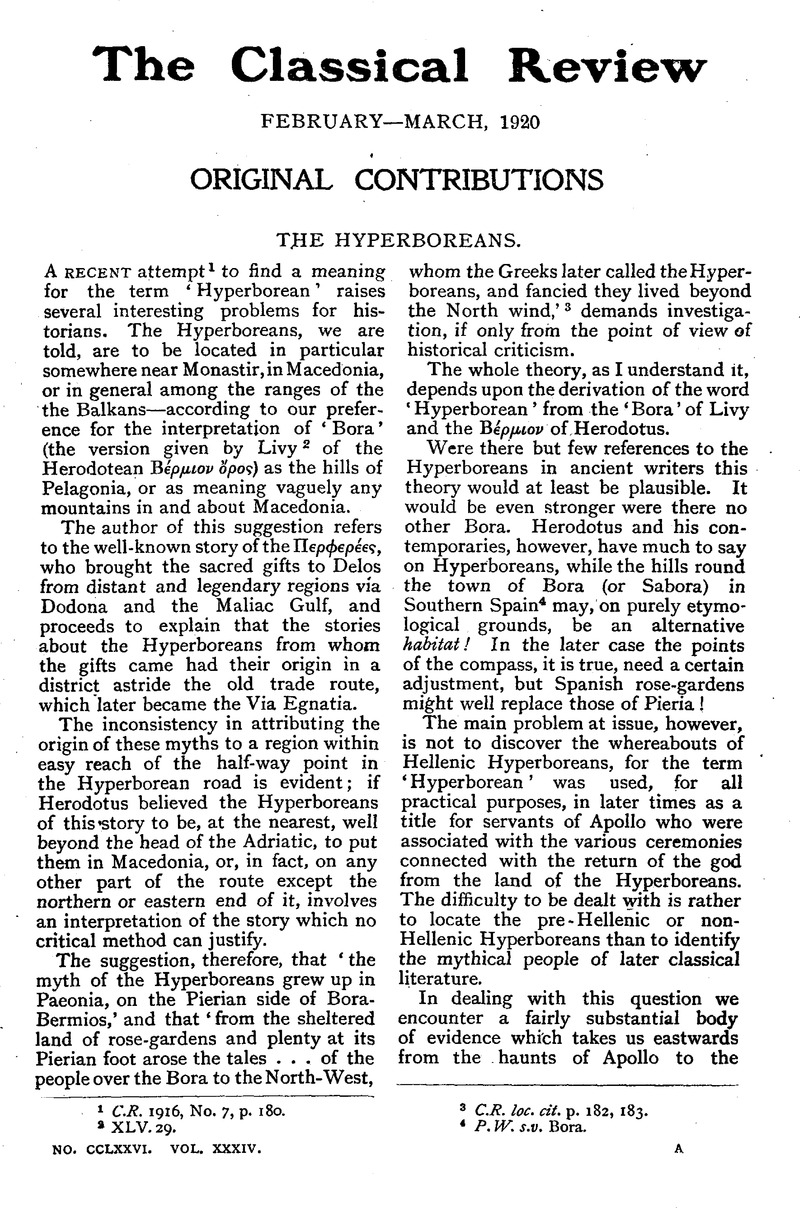Published online by Cambridge University Press: 27 October 2009

page 1 note 1 C.R. 1916, No. 7, p. 180.
page 1 note 2 XLV. 29.
page 1 note 3 C.R. loc. cit. p. 182, 183.
page 1 note 4 P. W. s.v. Bora.
page 2 note 1 Aristeas (Hdt. IV. 13) gives us the series Issedones—Arimaspi—Griffins—Hyperboreans—θ⋯λασσα, while Damastes (Steph. Byz. s.v. Ὑπερβ.) gives it as Scythians—Issedones—Rhipean mountains—Hyperboreans—⋯ ⋯τ⋯ρα θ⋯λασσα.
page 2 note 2 IV. 32.
page 2 note 3 IV. 36.
page 2 note 4 An echo of the rival theories may, perhaps, be found in the scholiast to Pindar Ol. III. 28, where Philostophanus represents the ‘North Greek,’ as opposed to the ‘Pelasgian’ theory of others.
page 2 note 5 Ovid, Metamorph. V. 86.
page 2 note 6 V. 7, 7.
page 2 note 7 Steph. Byz. s.v. Ὑπερβ⋯ρεοι.
page 2 note 8 An eastern type of name.
page 2 note 9 Strabo XV. 711. Stories of this type still survive in the Middle East. Thus, in Circassia ‘it is said that there are certain Eden-like districts in the interior, only known to this people (the Circassians) sheltered by the (Caucasian) Alps from every harsh wind, where the cold of winter and the heat of summer are equally unknown’ (Spencer, , Turkey, Russia, the Black Sea, and Circassia, 1854, p. 241)Google Scholar.
page 2 note 10 I. 31, 2.
page 3 note 1 The author of the article referred to in the C.R. states incidentally that ‘the modern bishopric still preserves the name Pelagonia.’ In the same way the Vardar ‘preserves’ the ancient name of Axius—by revival. Until more used to the ancient names the modern inhabitants will continue, as at present, to ‘preserve’ them only on official documents and maps.
page 3 note 2 Farnell, , Cults, vol. iv. p. 103, noteGoogle Scholar.
page 3 note 3 This view is put forward by Tomaschek, quoted by Minns, (Scythians and Greeks, p. 114)Google Scholar, and was previously suggested by Gladisch (Roscher Lexikon, col. 2829).
page 3 note 4 The ‘justice’ and ‘simple life’ of primitive tribes is a commonplace in Herodotus.
page 3 note 5 Cf. also Protarchus quoted by Steph. Byz. s.v. Ὑπερβ.